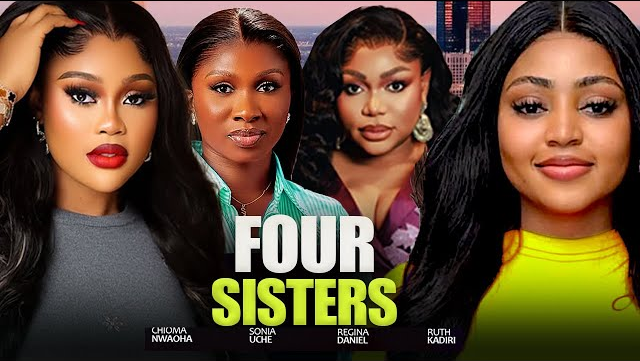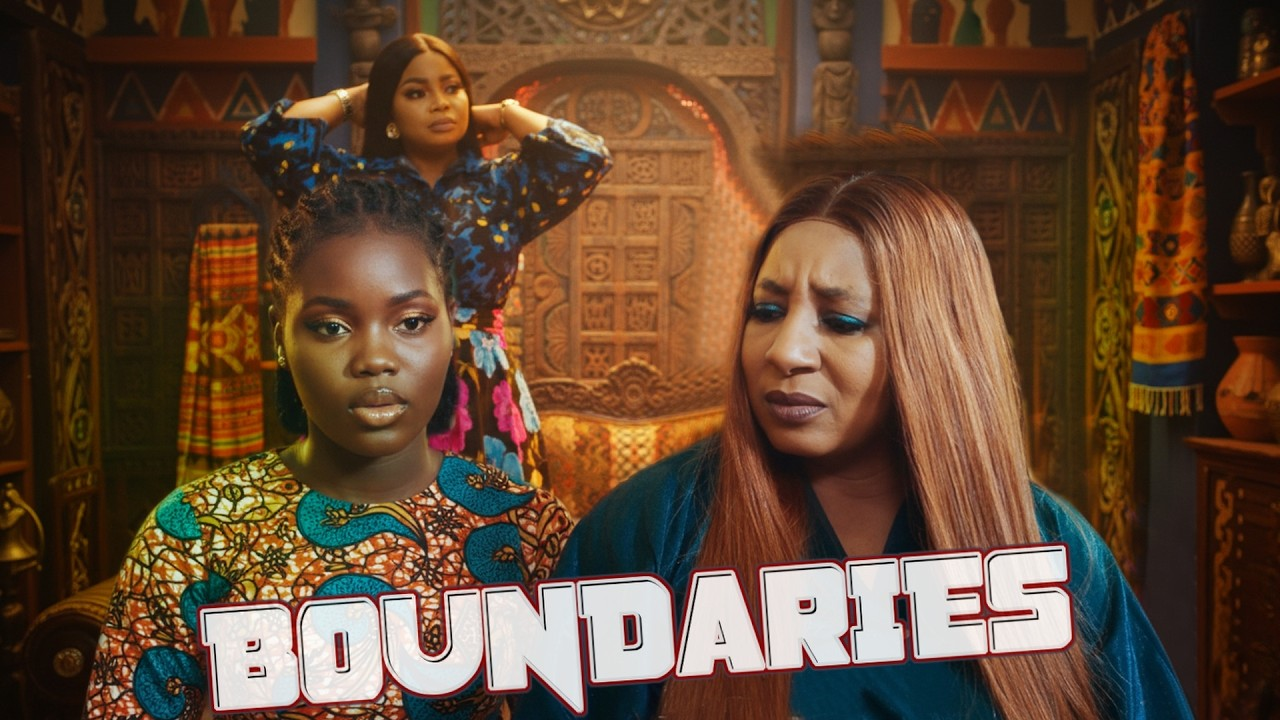An Introduction to Deceit and Diaspora Dilemmas
FOUR SISTERS doesn’t just arrive on the Nollywood scene; it explodes with the kind of high-stakes, culturally resonant melodrama that reminds audiences why Nigerian cinema holds such global appeal. This 96-minute feature, starring a powerhouse cast including Chioma Nwaoha and Regina Daniels, tackles a dilemma as old as the diaspora itself: the punishing pressure to satisfy traditional parents while living a modern life abroad. It asks: How far will a Nigerian man go to maintain a facade, and what happens when the deception involves an innocent woman from the village?
FOUR SISTERS succeeds not merely as a high-stakes melodrama but as a pointed social commentary, utilizing a deeply uncomfortable premise—a fraudulent proxy marriage—to expose the unsustainable pressure points where diaspora life collides with rigid Nigerian cultural expectations. It’s a compelling, often hilarious, and ultimately heartbreaking journey into deceit, cultural identity, and the transformative power of genuine love. This film is more than just a drama; it’s a critique dressed in wedding attire.
1. Narrative, Pacing, and Structural Integrity
Rating: ……………………… (4/5 Stars)
The central hook of FOUR SISTERS—Johnny (the man abroad) engineering a proxy marriage with a village woman (Mimi) to satisfy his mother, all while secretly having a wife and family in the diaspora—is a narrative tightrope walk. The film succeeds because it understands its core engine: impending discovery.
The 96-minute run-time is remarkably well-judged, leading to a consistently brisk pace. The narrative doesn’t waste time establishing its premise; the initial scenes are sharp, quickly outlining Mama’s cultural demands and Johnny’s immediate, flawed solution. The tension builds organically in three distinct phases:
The Setup (Deceit): Establishing the plot and introducing the proxy groom, Usher, who is forced into the lie. This phase is characterized by nervous humor and frantic planning.
The Bonding (Unforeseen Connection): This is the film’s core strength. The forced proximity between Mimi and Usher, the proxy, leads to genuine connection and emotional vulnerability. We see Usher’s internal conflict grow as he falls for the woman he is supposed to be deceiving for his cousin. This slower, emotionally charged section is crucial and earns its time.
The Confrontation and Aftermath (Discovery): The inevitable happens. The reveal of the “white wife,” Vienna/Fiona, forces the plot into a sharp, emotional confrontation. The clarity of the structure is commendable; the film commits to following through on the consequences of Johnny’s actions, leading to a satisfying, if dramatically painful, conclusion.
Suspension of Disbelief
The concept of a proxy marriage facilitated with such brazen dishonesty requires significant suspension of disbelief. While Johnny’s long-term deception (maintaining two families across continents) stretches credibility, the script intelligently grounds this with the overwhelming cultural and financial stakes involved. The audience accepts the absurdity because the emotional reality of the characters’ predicament—particularly Usher and Mimi’s—feels entirely earned. The structure is clear, the beats hit precisely, and the pacing ensures there is rarely a dull moment.
2. Character Development and Acting Depth
Rating: ………………………….4½ (4.5/5 Stars)
The film’s success rests squarely on the shoulders of its performers, who navigate the high-wire act of melodrama without descending into pantomime.
Mimi (The Protagonist)
Chioma Nwaoha’s portrayal of Mimi is the film’s beating heart. Her transformation from a naive, almost provincial young woman into someone capable of self-assertion is masterfully handled. Nwaoha nails the initial vulnerability and the charming, authentic use of Nigerian Pidgin English (NPE), which generates most of the early, necessary comic relief. When the heartbreak comes, it is devastating because Nwaoha has effectively convinced us of Mimi’s genuine, trusting nature. Her final act of independence is believable and provides the thematic closure the audience craves.
Usher (The Proxy/Love Interest)
The chemistry between Mimi and the proxy groom, Usher, is the true emotional triumph. Usher’s arc—from a resentful cousin forced into a deceitful arrangement to a man genuinely protecting and falling for Mimi—is the most compelling. The actor effectively communicates a wealth of conflict through subtle expressions; the stolen glances, the guilt in his eyes, and the sheer desperation when the lie begins to crumble. This performance ensures the audience roots for the forbidden, honest love over the fraudulent, sanctioned one.
Johnny (The Deceiver)
Johnny, the architect of the chaos, is deliberately written to be unsympathetic, and the actor embraces this. His conflict isn’t between two women, but between his own ego, his mother’s inheritance, and his cowardice. While the script attempts to give him a brief moment of regret, the character serves primarily as a catalyst, representing the tragic, selfish consequences of succumbing to parental pressure. He is the necessary villain of circumstance.
Mama (The Pressure)
The character of Mama is a classic, demanding Nollywood matriarch. While this archetype can sometimes feel cartoonish, the performance here manages to anchor her firmly in reality. Her demands are not just theatrical; they are rooted in a genuine, but flawed, cultural worldview that privileges tradition over her son’s happiness. Her severity provides the high stakes required to justify Johnny’s drastic actions.
3. Cultural Relevance and Social Commentary
Rating: ………………………. (5/5 Stars)
This is where FOUR SISTERS moves beyond mere entertainment and establishes itself as an essential piece of contemporary cultural commentary.
The “Home-Grown” Wife Trope
The film is a direct examination of the “Aku-luo-uno” (coming back home) pressure—the deeply entrenched belief that a successful Nigerian man in the diaspora must return home to marry a “home-grown” or “proper” Nigerian wife, often implying that a foreign-raised or non-African partner is inadequate. The film doesn’t just display this trope; it critiques the inherent toxicity of it. Johnny is forced to ruin three lives because his mother equates a wife’s origin with her moral worth. The deception is a desperate reaction to a cultural demand that is revealed to be destructive and unsustainable.
Village vs. City Dynamics
The contrast between Mimi’s humble village background and the sterile, opulent wealth of Johnny’s Lagos mansion and diaspora life is effectively used to underscore the film’s themes. Mimi represents a pure, unblemished authenticity that the sophisticated, Westernized world of Johnny lacks. Conversely, Johnny’s world represents hypocrisy and a desperate need to maintain appearances, regardless of the emotional cost. The use of these settings is visually symbolic: the deception lives in the luxury, while truth and genuine affection are nurtured in the simplicity.
Dialogue (Pidgin and Vernacular)
The film’s dialogue is its secret weapon, particularly the extensive use of authentic Nigerian Pidgin English (NPE). Mimi’s comfort with Pidgin is immediately endearing, establishing her character as relatable and grounded. The humor derived from her misunderstandings or candid expressions in Pidgin is sharp and authentic. This linguistic choice grounds the film, avoiding the often stiff, overly formal English found in older productions, and instantly connects the audience to the characters’ realities. The dialogue is not just conversation; it is a vital tool for social and class distinction.
4. Technical Execution
Rating: ……………………. (4/5 Stars)
Technically, FOUR SISTERS showcases the polish of modern Nollywood, moving far beyond its rougher, low-budget roots.
Cinematography and Set Design
The visual quality is sharp and high-definition. The cinematography effectively uses visual contrast: the bright, almost clinical lighting of the diaspora home (reflecting the artificial nature of Johnny’s life) is juxtaposed against the warmer, more natural hues of the village and the intimate spaces where Mimi and Usher bond. Set Design plays a key symbolic role; the wedding scene is lavishly decorated, emphasizing the scale of the lie, while the quiet, simple scenes between Mimi and Usher feel more authentic and real.
Sound and Music
The sound design is clean, with the dialogue always taking center stage. The musical score is deployed precisely to underscore the emotional beats. Melancholy strings and powerful percussion punctuate the key emotional moments—the proxy marriage ceremony, the tense moment of discovery, and the final scene of reconciliation. The music effectively manipulates the audience’s feelings, a classic and effective melodrama technique.
Editing
The editing is generally smooth and professional. The cuts are tight, ensuring the rapid pace is maintained without jarring continuity errors. The transition between the high-octane emotional scenes and the quieter moments of reflection is handled with the necessary restraint, showcasing a production team that respects the narrative arc and the emotional needs of the audience. There are no significant flaws in the technical execution that detract from the story.
Verdict and Call-to-Watch
FOUR SISTERS is a superb example of contemporary Nollywood, taking a familiar premise—the intersection of love and cultural pressure—and elevating it through sharp writing, strong technical execution, and compelling performances.
The film scores high marks for its unflinching look at the generational divides and the cultural burden placed upon those living abroad, making it a powerful piece of social commentary disguised as a romance. The narrative is engaging, the acting is top-tier (particularly Chioma Nwaoha and her counterpart), and the ending, while providing emotional relief, doesn’t shy away from the pain of the journey.
Overall Rating: ………………………4½ (4.5/5 Stars)
Recommendation: This is a must-watch for fans of family drama, Nollywood cinema, and stories that tackle complex cultural issues head-on. If you enjoy narratives built on explosive revelations and characters finding unexpected strength, queue up FOUR SISTERS immediately. It’s the kind of film that will have you talking about its central deception long after the credits roll.
Have you seen ‘FOUR SISTERS’? Let me know in the comments if you think Johnny was the real villain or if the cultural pressure was to blame!
#NollywoodTimes
#NollywoodDrama
#ProxyBride
#DiasporaDilemma















Leave a Reply